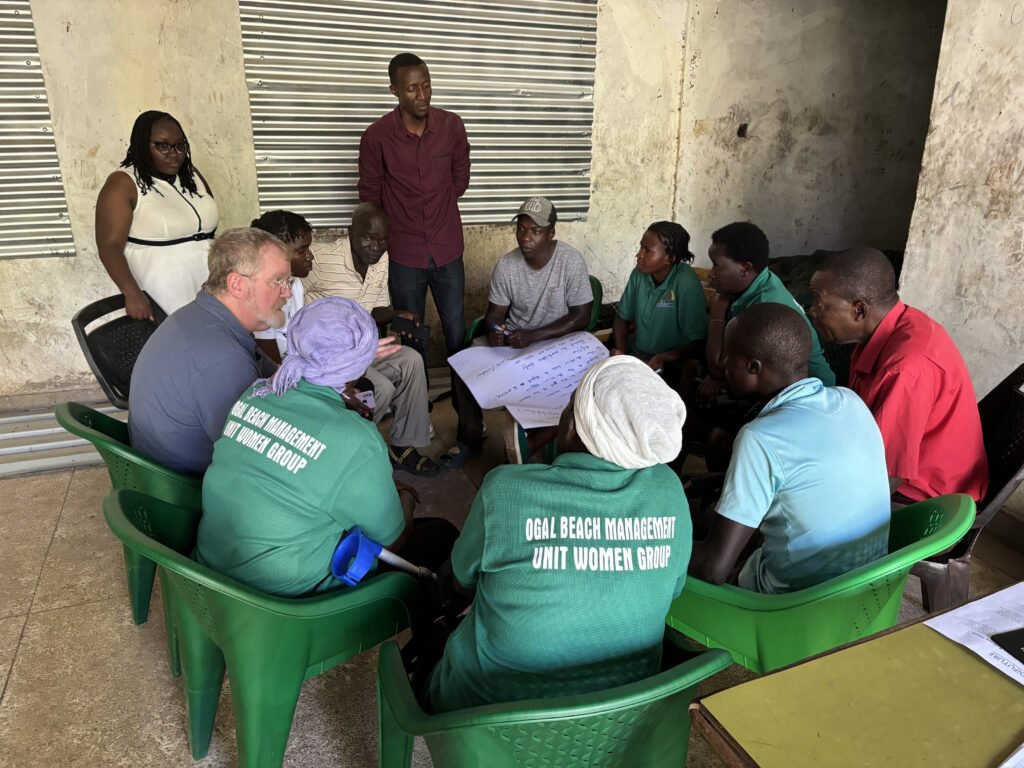By Murimi Gitari
For Kenyan cage fish farmers in Lake Victoria, the risk of mass fish deaths is never far away. In October last year alone, some 50 tonnes of fish were reported lost to mass fish deaths affecting 300 cages. Experts attribute the problem to pollution, disease and poor biosecurity practices.
Biosecurity practices are the measures that farmers can take to reduce the risk of introduction and transmission of pathogens in their cages. Cornell University College of Veterinary Medicine, the Kenya Marine and Fisheries Research Institute (KMFRI), and the International Livestock Research Institute (ILRI) are collaborating on a project to empower smallholder fish farmers to improve biosecurity practices and strengthen disease surveillance.
The initiative, which is supported by the USAID-funded Feed the Future Innovation Lab for Fish, focuses on equipping fish farmers with the knowledge and tools necessary to reduce fish deaths and enhance aquaculture productivity. It involves practical training on key areas such as biosecurity practices, proper siting of cages, management of cage nets, and early recognition of clinical signs for tilapia diseases.
“By studying fish health and collaborating with farmers in Kenya, interdisciplinary Cornell researchers are integrating social sciences and veterinary medicine to address disease monitoring and response systems in partnership with KMFRI and ILRI. Our goal is to equip farmers with actionable practices to reduce losses and sustain their livelihoods while safeguarding the aquatic food system,” said Dr Kathryn Fiorella, an environmental scientist and epidemiologist at Cornell University. In Kenya, the fisheries and aquaculture sector contributes 0.5 percent to the national GDP and accounts for 2.0 percent of the country’s export earnings.
Small-scale producers are fundamental to this production and the fish supply, and fish health and supply are critical to the success of the small-scale producers’ businesses.
Improving Practices Through Hands-n Training
The project launched with training sessions across five counties, namely, Kisumu (Ogal beach), Siaya (Anyanga beach), Busia (Mulukoba beach), Homa Bay (Kaugege beach), and Migori (Sori beach) with 143 cage farmers and 75 Kenyan scientists trained. A key component of the programme was the active involvement of women leaders, who addressed critical issues such as prevention of fish deaths.
Farmers also received multilingual pamphlets summarizing best practices for fish farming management, using visual guides to demonstrate the optimal approaches for dead fish disposal, stocking of fingerlings, promoting water circulation within the cage environment, and early recognition of tilapia disease. Tom Guda, Chairman of the Regional BMU network, said:
“Through linkages and partnerships with organizations like KMFRI, ILRI, Cornell, and the BMU Network, we are creating a united front to empower women in fish farming. These collaborations ensure women are supported at every stage of the value chain— from training in cage establishment and proper fish husbandry to strengthening their financial capabilities through business practices. Together, we are not only enabling economic independence but also dismantling cultural barriers and creating equitable opportunities.”
Leveraging Advanced Science to Tackle Disease
The training will link with ongoing laboratory analysis and contributions from the technology to improve productivity for cage farmers. Samples collected from the linked disease surveillance program are being analyzed at ILRI’s laboratories. Leveraging its advanced facilities and expertise in genomic sequencing and antimicrobial resistance, ILRI is supporting the identification of pathogens and addressing antimicrobial resistance (AMR), which can support farmers in mitigating disease risks. Dr. Ekta Patel, a scientist on the project at ILRI, remarked, “As part of the CGIAR, ILRI is committed to conducting research that delivers practical solutions to benefit the countless farmers who rely on science to sustain their livelihoods. I am excited to be part of this partnership and look forward to strengthening laboratory capacity to advance disease surveillance and improve outcomes for these farmers.”
Strengthening Aquaculture through Collaboration
Dr. Christopher Aura, Director of Freshwater Systems at KMFRI, emphasized the institute’s mandate as a state corporation conducting aquatic research to guide the sustainable use of blue resources. He remarked, ‘The training sessions and our collaborative efforts on fish disease and biosecurity research demonstrate KMFRI’s enduring partnership with Cornell University. Gaining a deeper understanding of fish safety and biosecurity is vital for improving the management, productivity, and performance of fish farms, including cage culture.
Ensuring proper cage siting and implementing best aquaculture practices are fundamental to achieving better biosecurity and sustainable results for farmers.’ As the demand for animal-source foods increases, such initiatives represent an important step towards improving fish health and strengthening Kenya’s aquaculture sector.

